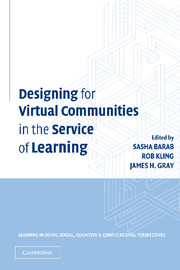Book contents
- Frontmatter
- Contents
- List of Contributors
- Series Foreword
- Foreword
- Preface and Acknowledgments
- In Memoriam
- PART I COMING TO TERMS WITH COMMUNITY
- PART II DESIGNING FOR WEB-SUPPORTED COMMUNITY
- PART III FOSTERING COMMUNITY/MEMBER PARTICIPATION
- PART IV RESEARCHING ONLINE COMMUNITY
- 11 Scholarly Networks as Learning Communities
- 12 Computer-Mediated Discourse Analysis
- 13 Shared “We” and Shared “They” Indicators of Group Identity in Online Teacher Professional Development
- 14 Sociocultural Analysis of Online Professional Development
- Index
- Titles in the series
- References
12 - Computer-Mediated Discourse Analysis
An Approach to Researching Online Behavior
Published online by Cambridge University Press: 05 June 2012
- Frontmatter
- Contents
- List of Contributors
- Series Foreword
- Foreword
- Preface and Acknowledgments
- In Memoriam
- PART I COMING TO TERMS WITH COMMUNITY
- PART II DESIGNING FOR WEB-SUPPORTED COMMUNITY
- PART III FOSTERING COMMUNITY/MEMBER PARTICIPATION
- PART IV RESEARCHING ONLINE COMMUNITY
- 11 Scholarly Networks as Learning Communities
- 12 Computer-Mediated Discourse Analysis
- 13 Shared “We” and Shared “They” Indicators of Group Identity in Online Teacher Professional Development
- 14 Sociocultural Analysis of Online Professional Development
- Index
- Titles in the series
- References
Summary
Over the past fifteen years, the Internet has triggered a boom in research on human behavior. As growing numbers of people interact on a regular basis in chat rooms, web forums, listservs, email, instant messaging environments and the like, social scientists, marketers, and educators look to their behavior in an effort to understand the nature of computer-mediated communication and how it can be optimized in specific contexts of use. This effort is facilitated by the fact that people engage in socially meaningful activities online in a way that typically leaves a textual trace, making the interactions more accessible to scrutiny and reflection than is the case in ephemeral spoken communication, and enabling researchers to employ empirical, micro-level methods to shed light on macro-level phenomena. Despite this potential, much research on online behavior is anecdotal and speculative, rather than empirically grounded. Moreover, Internet research often suffers from a premature impulse to label online phenomena in broad terms, for example, all groups of people interacting online are “communities”; the language of the Internet is a single style or “genre.” Notions such as community and genre are familiar and evocative, yet notoriously slippery, and unhelpful (or worse) if applied indiscriminately. An important challenge facing Internet researchers is thus how to identify and describe online phenomena in culturally meaningful terms, while at the same time grounding their distinctions in empirically observable behavior.
Information
- Type
- Chapter
- Information
- Designing for Virtual Communities in the Service of Learning , pp. 338 - 376Publisher: Cambridge University PressPrint publication year: 2004
References
Accessibility standard: Unknown
Why this information is here
This section outlines the accessibility features of this content - including support for screen readers, full keyboard navigation and high-contrast display options. This may not be relevant for you.Accessibility Information
- 448
- Cited by
